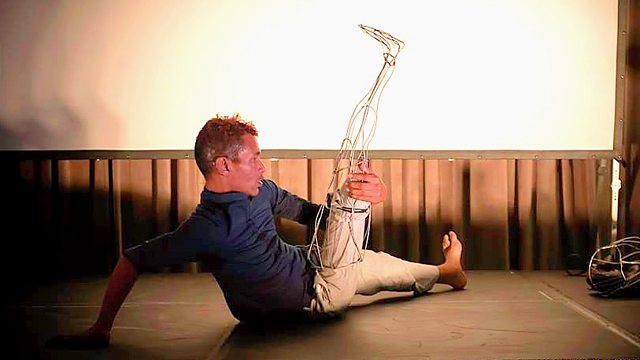Art breaking barriers
Lessons from artists, writers and directors using art to bridge divides regardless of disability, religion, class or sexuality in South Africa, India, Kenya and Northern Ireland
The Cultural Frontline celebrates artists, writers and directors using art to bridge divides and provide a platform for everyone to tell their stories.
Many theatres around the world now include some accessible versions of their shows for people with disabilities, such as captioned performances for Deaf audiences. But how accessible is theatre for performers with disabilities and do disabled audiences feel represented by the content being performed?
We hear from two champions of accessibility in theatre: Amit Sharma, theatre director for disabled theatre company Graeae and Dr Marlene Le Roux from Artscape Theatre in Cape Town.
Prayaag Akbar writes about the divides that separate so much of private and public life in India. His latest novel Leila imagines life in an Indian city in the near future, in which religious and ethnic groups have begun to build enormous walls around their communities to ensure what’s described as “purity for all”. Prayaag tells the story of a mother trying to reunite with her daughter in an increasingly hostile society, and shares his own experiences of caste, class and religious divisions.
Moroccan writer Leila Slimani was appointed by French President Emmanuel Macron as his personal representative and global champion of French language and culture – a recognition perhaps that the future of the language is in Africa. It’s estimated that by 2050 more than eight out of ten of the world’s French speakers will live in that continent. Leila tells us about the classic French song with a special place in her heart.
We also hear about the Sex Workers Opera, giving voice to an often marginalized group of women and men. They’re working with SWEAT in Cape Town – that’s the Sex Workers Education and Advocacy Taskforce - to establish a sex workers theatre there.
The Wajuku studio and arts club is encouraging creativity in the Makuru informal settlement near the Kenyan capital Nairobi. Artist Shabu Mwangi founded Wajuku to give young people living in poverty access to art.
Plus - the Theatre of Witness in Northern Ireland involves men and women who were in the police or prison service, or paramilitary groups, or whose families were attacked during the 30 year conflict there, known as “The Troubles”. They visit schools in areas deemed to be at high risk from paramilitary activity, to share their stories with schoolchildren in an effort to prompt healing and understanding across the Protestant/Catholic religious divide.
Presenter: Tina Daheley
Producer: Paul Waters
Image: performer from the Unmute Theatre Company, Cape Town, South Africa. Credit: Danie Coetzee
Last on
More episodes
Previous
Broadcasts
- Sat 13 Apr 2019 01:32GMT���˿��� World Service except Online, Americas and the Caribbean, Australasia & UK DAB/Freeview
- Sat 13 Apr 2019 17:32GMT���˿��� World Service Australasia, South Asia, West and Central Africa & East Asia only
- Sat 13 Apr 2019 19:32GMT���˿��� World Service East and Southern Africa & West and Central Africa only
- Sun 14 Apr 2019 10:32GMT���˿��� World Service
- Sun 14 Apr 2019 21:06GMT���˿��� World Service except East and Southern Africa & West and Central Africa
Podcast
-
![]()
The Cultural Frontline
The Cultural Frontline: where arts and news collide.


